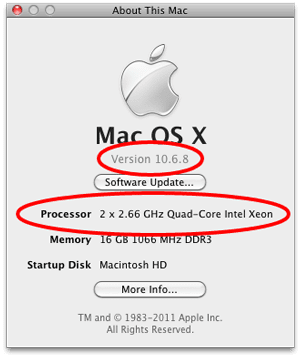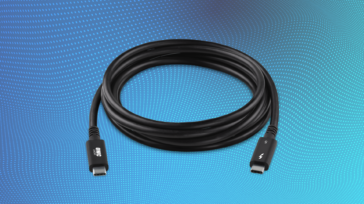 Just a quick reminder: when OS X 10.7 is released later this month, there will be no support for PowerPC applications running under Rosetta. As we’ve known for several months now, Apple has pulled support for the PPC emulation in its latest OS, so users who are using older software reliant on this technology will find that it won’t work after upgrading.
Just a quick reminder: when OS X 10.7 is released later this month, there will be no support for PowerPC applications running under Rosetta. As we’ve known for several months now, Apple has pulled support for the PPC emulation in its latest OS, so users who are using older software reliant on this technology will find that it won’t work after upgrading.
For quite some time now, Apple has been telling developers that they’d better switch over to Intel code; Power PC support (Rosetta) wasn’t going to be around forever. Apple made Snow Leopard Intel-only, but Rosetta was available as a custom-install. By that point, devs should have converted to Intel if they hadn’t already. Now, Rosetta is gone and end users need to make the choice whether to stick with the OS version and computers they have so they can run the software, or upgrading their systems and switching to another program.
This really isn’t a new thing. When Apple did this with Classic support in 10.4, there were several companies who didn’t update their code and were left out. Many users moved on – Quark took a big hit after not updating, giving Adobe InDesign a decent foothold. The same thing will likely happen now. If they don’t keep up with the OS, developers will lose customers to another company that did.
Right now, the biggest “offender” in not keeping their software up-to-date would be Quicken; only one of their packages – Quicken Essentials – doesn’t rely on PPC code (and therefore Rosetta) to run. Their other, more featured, packages (last updated in 2007), will no longer run if you move to Lion.
What action do they suggest you take if you plan on upgrading to Lion? According to their Web site, you should either switch one of their other services (like Essentials or Mint.com) which have fewer features, or use Quicken for Windows. I thank my lucky stars I don’t personally need a program like this (my finances are relatively simple), because those options are… well… somewhat less than acceptable.
While other factors may put off my migration to Lion in the near future, it does get me thinking about my system. Are there any applications I rely on that require Rosetta support? If so, are there updates I haven’t applied?
While a quick scan of my Applications folder didn’t turn up anything major, I know that at least my old scanner software won’t work, nor will some old Applescripts I used to use.
To check the bulk of your applications, open up System Profiler and click on Software>Applications in the left-hand column. On the right, all your applications will be listed. Look at the “Kind” column; if it says “PowerPC”, that app requires Rosetta to run and will need to be upgraded or replaced if you plan on switching to OS X 10.7 Lion.









I too have ambivalent feelings about upgrading to Lion. I want the new stuff that will sync with my other Apple devices, but don’t want to lose my “apps-of-old”. I haven’t upgraded my Office 2004 because I don’t use 90% of the new features touted with each new edition. Same goes for Toast and others. Why upgrade when the older one works at my level of needs. I definitely will miss Solitaire Til Dawn (the best 1000 hours I’ve spent over the past 5 years) and Quicken 2007. I think what I will do is partition my hard drive on the new iMac I’m getting into 10.4 and 10.7. That may solve the problem for me. I still have an old 20 gig portable hard drive that I keep 10.2 for so “Classic” apps I still use about once every month or two (and for which there is no newer upgrade or similar app). Good luck to all of us and I will be watching the OWC blog after 10.7 comes out to read further tips and workarounds from them and all of you.
I’ve got tons of documents, some dating back to my first Mac in 1984, which, for time to time, I need to open. Too many to convert en mass plus it would be a waste of time to convert thousands, just in case I have to access just one of them. They still work! Remember Multiplan? Many of my Appleworks documents do not convert with the same functionality in the newer programs. I have yet to find a program as useful as Tex-Edit for formatting and sorting metadata. Quicken 2005 has worked for me, but none of the modern programs seem to import Quicken files and handle the multiple classes as well.
Well, I guess my only choices are to keep my G3-233 ready to go for the really old stuff when needed plus set up a bootable hard drive run programs needing Rosetta.
For very infrequently used programs, consider making a bootable “backup” disk before upgrading. Then boot from it (USB probably), when the need arises. I consider this adequate for VERY infrequent usage such as:
A) user above who needs to calibrate a monitor (shouldn’t need it too often)
B) Occasionaly need to run an old program to find data. e.g. I’m replacing Quicken, but what if I need to clarify what was entered in 2001? If I’m unsure of my conversion (to moneydance), then If I’m desperate, I can reboot, and run Quicken on the original data file.
C) other data that I might not know will be unreachable in Lion, till I try to open the data file.
I plan on keeping the 2.5″ drive with bootable image for this purpose only for a year or two.
The only thing I will miss is Microsoft Office 2004 for Mac. Actually, no I won’t, thank you OpenOffice.
Not a single one will be missed.
Thanks for this post! Thank you!
Looking through my software there are a few Power PC things I don’t recognize, a few Epson items that have been replaced, and one great big one – the Artisan software used to profile my Sony Artisan monitor. It’s been a long time since Sony produced any of these monitors or upgraded the software, and I bought one of the last made. But it’s a great monitor for image editing, and at least at the moment mine is working fine. It’ll be a real pain if I have to replace it. Any ideas on workarounds?
Hi Jim,
I’m wondering if you ever figured out a solution to the Artisan calibration problem on Mac OS10.7 or 10.8?
Thanks for any tips!
Luckily my scanner software has already been updated for Lion, props to Fujitsu for releasing updated Scansnap software since earlier developer previews of Lion.
I second the vote for Solitaire Till Dawn and am heartened by the news that the developer is working on an update. I, too will miss Tex-Edit Plus. Another serious loss will be MacTheRipper. I know there are other apps out there that are universal/intel and do the job but they aren’t as flexible. I’ve tried several and they all are missing some features of MTR. And though it hasn’t been updated for ages it still runs fine on Snow Leopard.
Then there are other games like Rainforest Adventure and Snood…and other apps like Appleworks, which has never really been replaced.
I switched from Tex-Edit Plus to TextWrangler. It’s free.
For RTF files, I switched to Bean. It’s also free.
Tex-Edit Plus has been taking far too long to load on start-up.
Bean starts almost instantly.
Ditto here re/Bean. It’s become my complete go-to app for word processing.
Solitaire Till Dawn is a favourite of mine. I read somewhere the author is going to release an update which for me would mean I am willing to move up to 10.7. I also have a PowerPC version of MS Office but don’t use it opting instead for iWorks. The rest is a bunch of free or arcane shareware programs I don’t use.
Here’s hoping Symantec gets an Intel-native version of their Anti-Virus up and running quickly. My Network Administrator won’t let me run without it…
That’s really sad.
Symantec software drastically reduces the performance of a Mac due to all the CPU cycles it takes up.
Should be avoided.
You might want to look at Eset’s CyberSecurity for the Mac instead of the Symantec product:
http://www.eset.com/us/home/cybersecurity-for-mac
If that isn’t acceptable to your Network Admin he’s nuts.
-kpluk
When AppleCare replaced my ’08 MacBook lemon with a ’10 MacBook Pro I was no longer able to use InDesign 2.0 even with Rosetta installed. It seems MacOSX 10.6’s version of Rosetta is not a full implementation of PowerPC compatibility. I think that was the last PowerPC app I had.
I have been using Tex-Edit Plus since around 2002 and have many Applescripts that use it. It will be a major pain to switch to something else.
So far I haven’t found anything else that offers the same features without getting bloated in the process.
I too use Tex-Edit plus in my dev workflow. I develop natural language based resources (for the humanities), and so far I’ve not found anything that can suitably replace Tex-Edit. It’s not uncommon for me to go from Hebrew, to Greek, to Syriac, to Coptic, to Ethiopic, to Latin, to German in a page of my resources. I was compelled to urge the developer of Tex-Edit Plus to keep move his program into an intel version. I suspect he has received quite a few requests to do so. He was kind enough to reply to one of my emails and informed me he was running an update intel version. He also mentioned that he intended to make it public—but that was two weeks ago. Let’s hope he has decided to take some extra time to include some of Lion’s API’s — as it would certainly make Tex-Edit Plus more powerful. I even informed the developer that I am willing to pay for an upgrade or even purchase it off the Mac App Store.